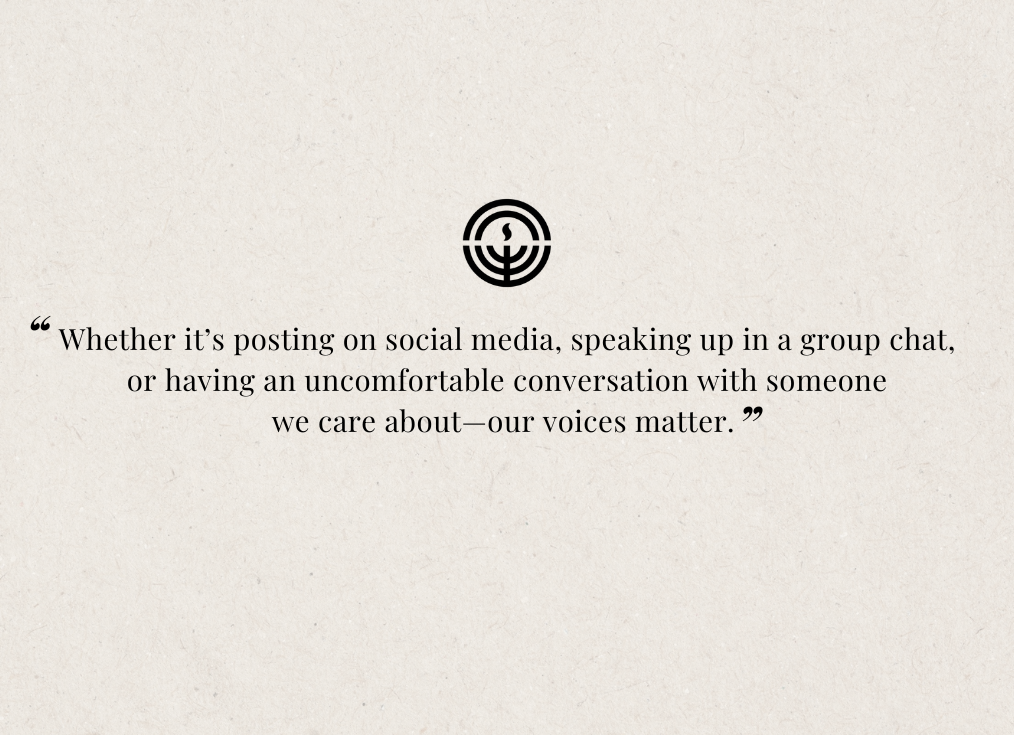“In the Room Where It Happens”: A J-LEV Reflection

Last month, I joined a cohort of young Jewish leaders from our local San Antonio Jewish community for the J-LEV (Jewish–Leadership, Engagement, and Values) Summit in Washington, D.C.—and though it was just an overnight trip, it left an impact that still has me feeling motivated and inspired. The purpose of the summit was simple but powerful: to learn how to advocate, to better understand the national issues impacting the Jewish community, and to use our voices to make a difference for ourselves and those around us. But what made it unforgettable was the feeling that we weren’t just learning about advocacy—we were doing it. We were in the room where it happens.
We had the opportunity to lobby for the Antisemitism Awareness Act, legislation that aims to give schools and universities clearer tools to identify and address antisemitism by adopting the IHRA definition. As a grandchild of Holocaust survivors and someone who has experienced antisemitism firsthand in San Antonio as a young teen and adult, I know how necessary it is to not just remember the past—but to act in the present. My grandmother taught me the importance of remembering and resisting hatred. I know how isolating and painful it can be when your identity is treated like a threat.
Sitting in a congressional office and sharing that story—my story—was nerve-wracking but powerful. I realized that advocacy isn’t about having all the answers. It’s about having the courage to show up and speak from the heart. We also advocated for Social Security and SNAP, programs that provide critical support for millions of Americans, including Jewish senior citizens, and for the Nonprofit Security Grant Program, which helps protect places like Jewish day schools and synagogues—spaces I’ve grown up in and still frequent today. These aren’t abstract policies. They’re lifelines. And we had the chance to make the case for why they matter. We deserve to feel safe in our Jewish spaces.
One of the most impactful moments came during a session with Minister Swason Hasson, the Minister for Public Diplomacy at the Israeli Embassy. In a time of heightened tension and grief following October 7th, her calm and steady resolve was striking. She spoke honestly about how the embassy has handled protestors outside its doors and the alarming rise in global antisemitism. But what stood out most was her message to us: in the fight against antisemitism, the most powerful thing we can do is not be silent.
Whether it’s posting on social media, speaking up in a group chat, or having an uncomfortable conversation with someone we care about—our voices matter. Staying quiet only helps the people who wish to erase us. That really stayed with me. Because sometimes, especially as young people, it’s tempting to think our role is to sit back and let the “experts” handle things. But Minister Hasson reminded us that advocacy begins in everyday moments. And that speaking up—even when it feels small—is an act of courage.
That message echoed something ancient. Coming off the heels of Pesach, I was reminded of Moses being called upon by God to speak to Pharaoh and demand freedom for the Israelites. But Moses’s first instinct was hesitation—“Who am I to speak?” he asks. He’s unsure, anxious, overwhelmed. And yet, despite that uncertainty, he shows up. He speaks out. And he becomes one of the greatest advocates for justice in history. We often think we need to be fully prepared before we act. But Jewish tradition teaches us that showing up imperfectly is still holy work. We don’t have to be experts. We just have to be present and willing to try.
And honestly? As a Broadway lover, it brought to mind Hamilton. That line—“I wanna be in the room where it happens”—captures so much of what drove us throughout the summit. The thing that pushed Hamilton forward wasn’t just ambition; it was conviction. He wanted to be part of something bigger, something that mattered. And not just to witness it—but to shape it. That’s what this trip felt like: stepping into the room and realizing that we belong there too. That when we’re given a seat at the table, we shouldn’t throw away our shot.
I left D.C. feeling more empowered, more connected, and more grounded in who I am—not just as a young adult or a Jewish person, but as someone who has a stake in the future. I saw firsthand that advocacy isn’t just for politicians or seasoned professionals. It’s for anyone who cares. It’s for people like us. And maybe that’s the most Jewish takeaway of all—balancing hope with responsibility. We’re not finished. We’re just getting started.
Shabbat Shalom
Eleanor Gossen
J-LEV Participant
About J-LEV
J-LEV (Jewish – Leadership, Engagement, Values) is the Jewish Federation of San Antonio’s Leadership Development Program, designed to cultivate the next generation of Jewish lay leaders in our community. Through a cohort-based model, participants engage in a series of interactive sessions that explore core Jewish values, leadership principles, and community-building strategies. The program offers a meaningful opportunity to develop leadership skills, build lasting relationships, and gain insight into San Antonio’s Jewish institutions and the many ways to get involved.
Graduates of J-LEV emerge empowered—with the tools, confidence, and connections to lead and serve across the community in impactful ways.
Visit our website for more information: J-LEV | Jewish Federation of San Antonio
